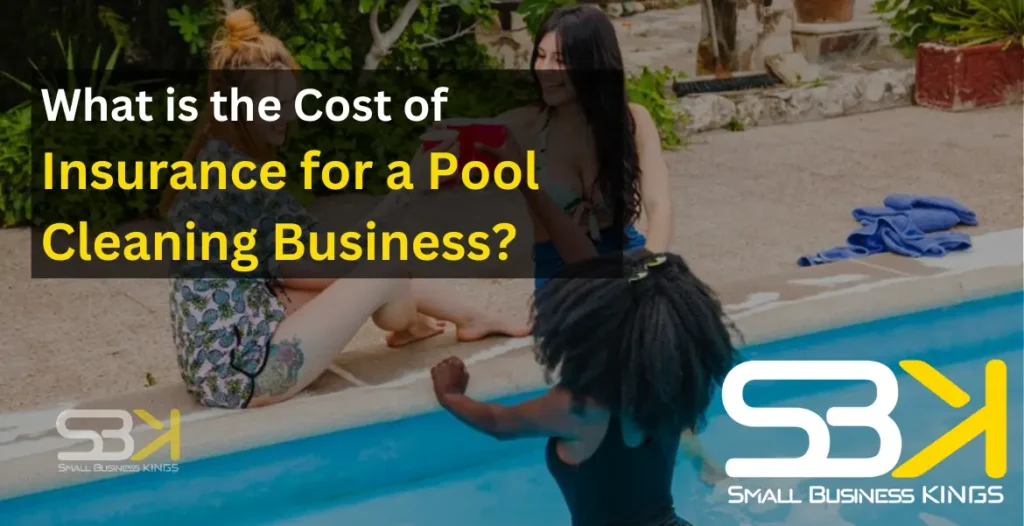Running a pool cleaning business can be rewarding, but it also comes with unique risks, such as property damage, bodily injury, or equipment loss. Without the right insurance coverage, these risks can result in significant financial setbacks. Insurance helps safeguard your business, your employees, and your clients by covering unexpected costs that could arise.
In this article, we’ll explore the typical costs of insurance for pool cleaning businesses, the essential types of coverage needed, and the factors that can influence insurance premiums. We’ll also discuss practical tips for securing affordable policies and how to choose the best insurance based on your business needs.
According to a 2020 survey by the National Association of Insurance Commissioners, small business owners spend an average of $1,200 annually on general liability insurance, though the costs can vary based on factors such as the size of the business and its location.
Importance of Insurance for Pool Cleaning Businesses
Insurance is more than just a safety net; it’s a fundamental aspect of running a responsible and legally compliant pool cleaning business. Without it, you risk facing lawsuits, fines, and business closure due to unexpected accidents. Pool cleaners are exposed to unique risks—whether it’s chemicals, equipment, or the potential for slips and falls. Proper insurance provides peace of mind, ensuring you’re protected in case of accidents or damages.
Not only does it protect your business, but it also helps you build trust with customers. Clients feel more comfortable hiring a pool cleaning service that is properly insured, as it shows professionalism and accountability. Therefore, the cost of insurance for your pool cleaning business is an investment in both your protection and reputation.
Types of Insurance Needed for Your Business
Each pool cleaning business faces unique risks that necessitate different types of insurance coverage. Let’s explore the most common policies required to ensure your business is fully protected.
General Liability Insurance
General liability insurance forms the core of most insurance plans for pool cleaning businesses. It provides coverage for third-party claims related to bodily injury, property damage, and advertising harm. For example, if a client slips on wet pavement after a pool cleaning and sues your business for medical bills, general liability insurance would cover the legal and medical costs.
Coverage Details:
- Bodily injury: Covers injuries sustained by others while on your business premises or caused by your work.
- Property damage: Covers damages to a client’s property that occur during your work.
- Advertising injury: Protects against claims of false advertising, infringement, or libel related to your marketing.
Workers’ Compensation Insurance
Workers’ compensation insurance is vital for pool cleaning businesses with employees. It pays for medical costs and lost wages for employees injured on the job. In many states, this coverage is legally required if you have employees, even if they are part-time.
Workers’ compensation requirements vary by state. For instance, in states like Florida, workers’ compensation insurance is mandatory for pool cleaning businesses with more than three employees, while in California, it’s required for even one employee. Make sure to review local regulations to guarantee compliance.
Equipment Insurance
As a pool cleaner, your business relies heavily on various tools and equipment such as vacuum cleaners, pool chemicals, and pumps. If these items are damaged or stolen, it could lead to significant expenses. Equipment insurance helps cover the cost of repairs or replacement, ensuring that your business can continue running smoothly.
Commercial Auto Insurance
If you use vehicles to carry equipment or travel to job locations, commercial auto insurance is essential. Commercial auto insurance provides coverage for vehicles utilized in business activities, unlike personal auto insurance, which only applies to personal use. This policy protects your business if your vehicle is involved in an accident while traveling to a client’s property.
Average Costs of Insurance
Insurance costs for a pool cleaning business can differ significantly depending on various factors. Here’s a breakdown of average monthly and annual premiums for common insurance types, helping you understand what to expect for your business.
General Liability Insurance:
On average, general liability insurance for a pool cleaning business costs around $38 per month, which totals $456 per year. However, this amount can vary depending on your business size, location, and risk exposure.
Workers’ Compensation:
The cost of workers’ compensation insurance varies based on the number of employees and the location of your business. In regions with higher accident rates, insurance premiums may be increased. For example, a business in Texas may pay around $0.60 per $100 of payroll for workers’ compensation, whereas a business in New York might pay $1.25 per $100.
Insurance Costs by Business Size and Scope
As your business grows and the number of employees increases, your premiums are likely to rise. For a small, residential pool cleaning business with one or two employees, insurance could cost as low as $500 annually. However, for a larger commercial operation with several employees, premiums could easily exceed $2,000 annually.
Factors Influencing Insurance Costs
Several factors can affect the cost of insurance for your pool cleaning business. Business Size and Number of Employees play a significant role. The more employees you have, the higher your insurance premiums are likely to be. Small businesses with only one or two workers can expect lower costs, while larger businesses may face higher premiums due to the increased risk of claims.
Location and Regional Risks also affect your premiums. Regions with elevated risks of accidents, theft, or natural disasters may lead to increased insurance costs. For example, pool cleaning businesses in Florida, which faces hurricanes, might pay higher premiums than those in less-risk-prone areas.
The Type of Services Offered impacts your insurance rates as well. If your business provides specialized services, like pool repairs or maintenance, rather than just basic cleaning, your premiums may be higher.
Lastly, your Claims History and Experience Level in the industry will influence costs. A clean claims history and long-term industry experience can help lower premiums, while a history of claims may increase them.
How to Obtain Insurance Quotes
Getting the right insurance quote for your pool cleaning business is a crucial step. Here’s how you can do it:
- Research: Start by researching reputable insurance companies that specialize in business insurance.
- Provide Accurate Information: Be sure to provide accurate details about your business, including the number of employees, services offered, and your location.
- Compare Quotes: Always get quotes from multiple providers and compare coverage options and premiums.
Don’t settle for the first quote you receive. Compare different policies, coverage amounts, and premiums to ensure you’re getting the best deal for your business. Some insurance providers may offer bundling discounts for multiple policies.
Look for insurance companies with a solid reputation, good customer reviews, and experience in the pool cleaning industry. Websites like Insureon, The Hartford, and Progressive offer insurance quotes tailored to small businesses.
Tips for Reducing Insurance Costs
While insurance is essential, there are ways to lower your premiums without compromising coverage. Bundling Policies for Discounts is a great option. Consider bundling different types of insurance, such as general liability and commercial auto insurance. Many insurers offer discounts for businesses that purchase multiple policies.
Maintaining a Good Claims History is another effective strategy. A clean claims history shows insurers that your business is a lower risk, which can result in lower premiums. To maintain a good record, implement safety measures, such as proper training and regular equipment maintenance, to prevent accidents.
Additionally, Implementing Safety Measures to Minimize Risks can significantly reduce insurance costs. Adopting practices like using non-slip mats around pool areas and offering safety training to employees helps reduce the likelihood of accidents, which may lower your premiums over time.
Conclusion
In conclusion, the cost of insurance for a pool cleaning business is an essential consideration that should not be overlooked. By understanding the different types of insurance available and the factors that influence premiums, you can choose the right coverage for your business. Whether you’re a small business owner or running a larger operation, the right insurance will provide peace of mind and protect your financial stability.
FAQs
- What is the most important type of insurance for a pool cleaning business?
General liability insurance is often considered the most important, as it covers a wide range of risks, including bodily injury and property damage. - Do I need workers’ compensation insurance if I only have one employee?
It depends on your state’s requirements. In some states, workers’ compensation is required even for one employee. - How can I reduce my insurance costs?
Bundling policies, maintaining a good claims history, and implementing safety measures are all ways to reduce your premiums. - Can I get insurance for my pool cleaning business if I operate from home?
Yes, you can, but you may need a business owner’s policy (BOP) to cover both your property and business needs. - How do I know if my pool cleaning business needs additional coverage?
If you offer specialized services like pool repairs or operate in high-risk areas, you may need additional coverage to protect against those risks.




